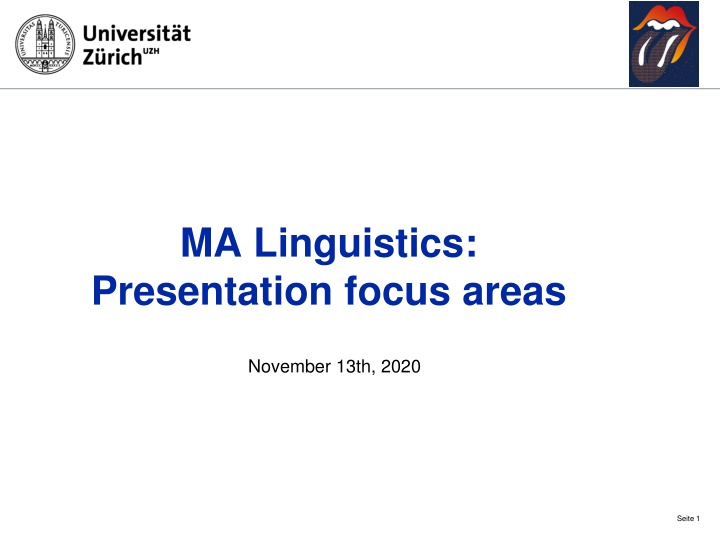
Exploring Focus Areas in English Linguistics for Research and Study
Dive into the diverse focus areas of English linguistics, ranging from language structure to historical syntax, offered in a master's program. Learn about the mid-term research plans of professors, sneak previews of upcoming courses, and the various lectures that delve into language evolution and usage.
Download Presentation

Please find below an Image/Link to download the presentation.
The content on the website is provided AS IS for your information and personal use only. It may not be sold, licensed, or shared on other websites without obtaining consent from the author. If you encounter any issues during the download, it is possible that the publisher has removed the file from their server.
You are allowed to download the files provided on this website for personal or commercial use, subject to the condition that they are used lawfully. All files are the property of their respective owners.
The content on the website is provided AS IS for your information and personal use only. It may not be sold, licensed, or shared on other websites without obtaining consent from the author.
E N D
Presentation Transcript
MA Linguistics: Presentation focus areas November 13th, 2020 Seite 1
English Linguistics English Department Marianne Hundt m.hundt@es.uzh.ch
Focus Area: English Linguistics Choice of four subject areas for research seminars (9 ECTS each, across 2 semesters) Language and the mind Language use Language structure Variation and change Regular lectures on Key Concepts in English Linguistics (3 ECTS each) Occasional project seminars (2 semesters, 15 ECTS) Plus choice of additional ECTS from other modules in the programme, we particularly encourage modules on Phonetics and Speech Science (taught in English > Volker Dellwo) 18.03.2025 Master in Linguistics 3
Focus Area: English Linguistics Mid-term planning research focus areas of professors at the department Marianne Hundt: history of English from 1500, World Englishes, Asian and Southern Hemisphere Englishes, construction grammar and (ongoing) grammatical change Andreas Jucker (until FS 2022): (historical) pragmatics, the pragmatics of fiction, politeness theory and speech act theory N.N. (from HS 2022): empirical-quantitative research on Second-and Foreign Language Acquisition of English, also in the context of multilingualism Daniel Schreier: (historical) sociolinguistics and dialectology, contact linguistics, lesser- known varieties of English Olga Timofeeva: Old and Middle English, medieval language contact and historical sociolinguistics, historical pragmatics, second-language acquisition in the Middle Ages 18.03.2025 Master in Linguistics 4
Focus Area: English Linguistics Sneak Preview FS 2021 Language and the mind: Constructions in Second Language Development (M. Hundt) Language use: Pragmatics of Fiction (A. Jucker) Language use: Corpus Pragmatics (A. Jucker) Language structure: Historical Syntax (M. Hundt) Language variation and change: Interactional Sociolinguistics (D. Schreier) The social history of English (A. Jucker) Principles of language change (D. Schreier) Lectures 18.03.2025 Master in Linguistics 5
Focus Area: English Linguistics Sneak Preview HS 2021 Language use: Internet pragmatics (A. Jucker) Language variation and change: Lexicon in the early middle ages (O. Timofeeva) Language variation and change: Terms of address: Synchronic and diachronic (A. Jucker) tba English in Modern Times (M. Hundt) English from a typological perspective (C. Gentens) Lectures 18.03.2025 Master in Linguistics 6
